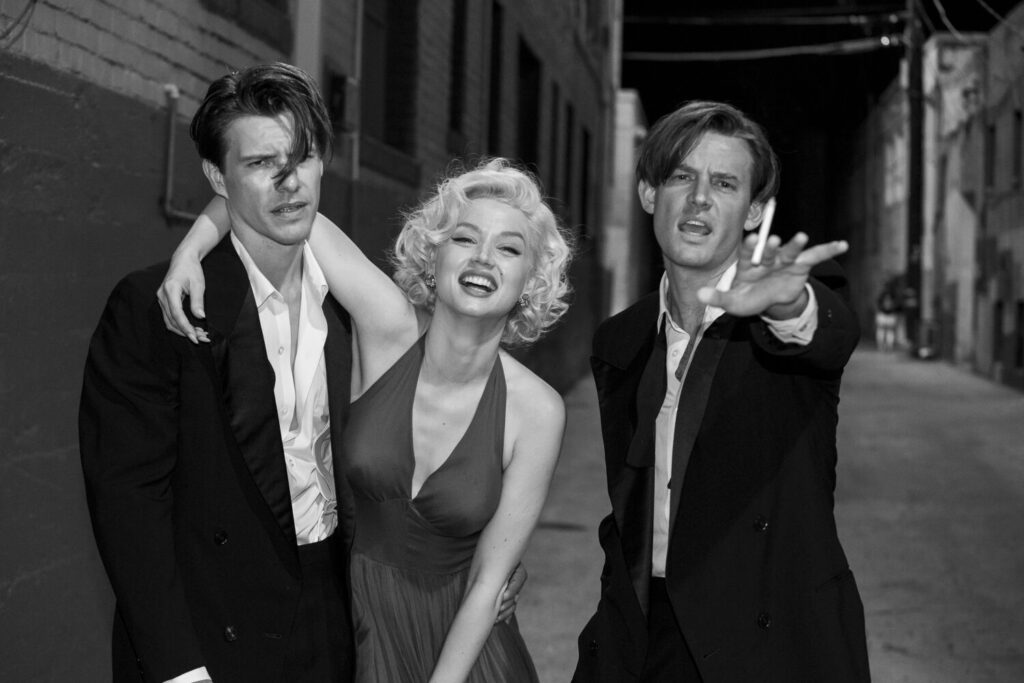Andrew Dominik spent more than a decade making a movie about Marilyn Monroe. So you’d think he would hold her in higher esteem. Apparently not.
In a new interview with the British Film Institute, the director let it rip about the background work he did in adapting Joyce Carol Oates’ 2000 novel, “Blonde,” for the screen. Apparently, the NC-17 film’s script was in large part about him and his feelings?
“I’ve read everything there is to read about Marilyn Monroe,” the New Zealand native told BFI in a video call from his home base in Melbourne, Australia. “I’ve met people that knew her. I’ve done an enormous amount of research. But in the end, it’s about the book. And adapting the book is really about adapting the feelings that the book gave me.”
Those feelings, published Tuesday, seem to be very strong.
“‘Blonde’ is supposed to leave you shaking,” Dominik said. “Like an orphaned rhesus monkey in the snow. It’s a howl of pain or rage.”
Dominik acknowledged skipping over some of “The Seven Year Itch” star’s achievements, including forming her own production company in the face of the studio system, dealing with the Red Scare witch hunts while married to Arthur Miller in the late 1950s and boosting the career of singer Ella Fitzgerald when a nightclub was afraid to book a “true jazz” singer.
“That stuff is not really what the film is about. It’s about a person who is going to be killing themself,” he said. “So it’s trying to examine the reasons why they did that. It’s not looking at her lasting legacy. I mean, she’s not even terribly concerned with any of that stuff.”
In his fictionalized tale, Dominik said, he chose to focus more on Monroe having it all — superficially — and still not being happy.
“If you look at Marilyn Monroe, she’s got everything that society tells us is desirable. She’s famous. She’s beautiful. She’s rich. If you look at the Instagram version of her life, she’s got it all. And she killed herself,” he says.
(In 1982, prosecutors who opened an investigation into Monroe’s death said that Monroe’s death from a barbiturate overdose could have been either accidental or intentional, adding nuance to the “probable suicide” explanation noted on her 1962 death certificate.)
“Now, to me, that’s the most important thing. It’s not the rest. It’s not the moments of strength. OK, she wrested control away from the men at the studio, because, you know, women are just as powerful as men. But that’s really looking at it through a lens that’s not so interesting to me. I’m more interested in how she feels, I’m interested in what her emotional life was like.”
In his review of “Blonde,” The Times’ Justin Chang noticed how star Ana de Armas was affected by Dominik’s approach.
“Radiantly sympathetic in scene after scene, she delivers a strong, intensely felt performance in a movie that doesn’t begin to earn it, that insists on squeezing her sometimes eerie channeling of Monroe’s image into the puniest possible dramatic mold,” Chang wrote. He called Dominik’s movie “dazzling, depressing and fatally incurious.”
And about that screaming-monkeys vibe? It’s in there.
“Even the levitational pleasure of that ‘Some Like It Hot’ scene can’t last,” Chang wrote. “Before long, this Marilyn isn’t singing; she’s screaming and flailing and bringing the production to a halt. Dominik doesn’t do much by halves, diva crackups included, and it’s dispiriting to realize that this is why he bothered with this particular Hollywood re-creation.”
Then again, maybe we shouldn’t fret about the movie too much.
“Does anyone care, really?,” Dominik said as the BFI piece concluded. “People who make films tend to think they’re incredibly important. But it’s just a movie about Marilyn Monroe. And there are going to be a lot more movies about Marilyn Monroe.”
Not that anyone, in his opinion, is really watching any of those movies that were made by Monroe.
“She’s somebody who’s become this huge cultural thing in a whole load of movies that nobody watches, right? Does anyone watch Marilyn Monroe movies?,” the director told writer Christine Newland in an outtake she posted to Twitter.
Newland explained to him that she and her friends enjoy watching “Gentlemen Prefer Blondes,” in part because of its worldview and because it’s a glamorous fantasy.
“What, because they’re well-dressed?,” Dominik said. “They’re well-dressed whores. I don’t know.”
“Blonde” has been playing in select theaters since Sept. 16 and starts streaming Wednesday on Netflix.

